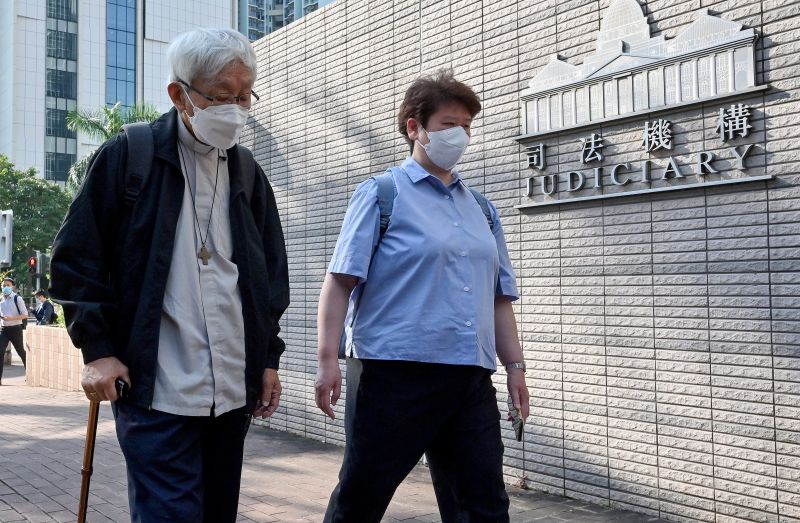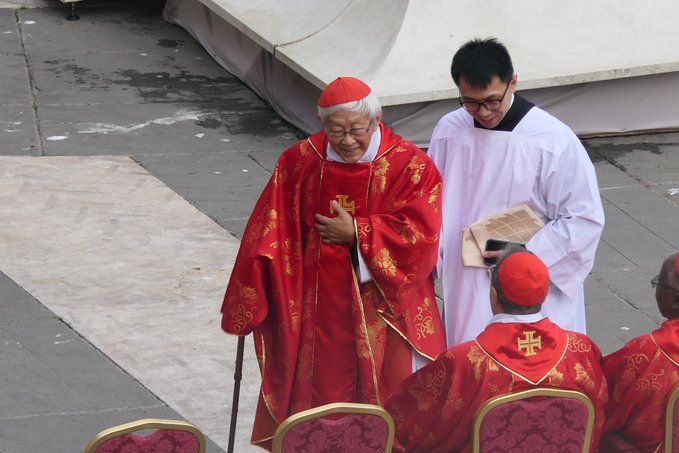 Hong Kong.Hong Kong media tycoon and founder of Apple Daily newspaper Jimmy Lai Chee Ying arrives at the West Kowloon Magistrates’ Court, May 18, 2020. / Credit: Yung Chi Wai Derek/Shutterstock
Hong Kong.Hong Kong media tycoon and founder of Apple Daily newspaper Jimmy Lai Chee Ying arrives at the West Kowloon Magistrates’ Court, May 18, 2020. / Credit: Yung Chi Wai Derek/Shutterstock
Washington, D.C. Newsroom, Feb 13, 2024 / 16:15 pm (CNA).
A religious freedom advocate from Hong Kong is warning that proposed legislation could further restrict religious liberty and lead to the persecution of the Catholic Church and other Christians.
Frances Hui, a Hong Kong native who has political asylum in the United States, expressed concern about the possible enactment of the controversial proposal Article 23, which would expand a 2020 national security law. She made these comments during a Hudson Institute panel discussion on “The Repression of Hong Kong and Heroism of Jimmy Lai.”
Lai, a pro-democracy journalist and convert to Catholicism, was arrested on several charges under Hong Kong’s 2020 national security law and could face life in prison. His newspaper, Apple Daily, frequently published material critical of the Chinese Communist Party. Although the Chinese government charged him with colluding with foreign forces, critics of the prosecution claim that he — and hundreds of other political and religious dissidents — were arrested for their activism.
If enacted, Article 23 would expand the law to bolster the government’s crackdown on political dissidents, which has been ongoing for more than three and a half years.
The change would add new offenses, including a prohibition on external interference in Hong Kong, a prohibition on supporting external intelligence organizations, and a prohibition on electronic and computer activities without lawful authority that endangers national security, along with a prohibition on general sabotage activities, according to the Hong Kong Free Press.
Hui, who serves as the policy and advocacy coordinator at the Committee for Freedom in Hong Kong Foundation, said during the panel that the legislation would “target foreign organizations [and] their activities in Hong Kong,” which could be used against foreign Christian missionaries and Hong Kong Catholic Church communications with the Vatican.
“A lot of the small- to medium-scale church groups, the Catholic Church, and foreign missionaries would all be affected,” Hui said.
“We don’t know how they’re going to use this law to go against religious groups, but having this law passed and imposed in Hong Kong would be a great threat to religious groups in Hong Kong,” she added. “They are subject to legal prosecution. … The Catholic Church in Hong Kong … might have to stop their communication with the Vatican because it’s a foreign state.”
In such a scenario, Hui warned that the Catholic Church in Hong Kong could be forced to join the Catholic Patriotic Association, which the communist government established in 1957 to exert government control of Catholic churches in mainland China.
“We don’t know how they’re going to use this because it’s another vaguely written law, but … if they don’t like what you’re doing and they have targeted you, they have the law at their disposal to use that to threaten you and put you in jail,” Hui said.
The legislation was first proposed more than 20 years ago in 2002, but the effort was rejected after widespread backlash from the people of Hong Kong, journalist associations, and Western governments. The effort, however, was revived by Hong Kong Chief Executive John Lee Ka-chiu in 2022. On Jan. 30, Lee began a one-month consultation period on the proposal.
“I think this is something the world and the American government should pay attention to and [should] speak up against it,” Hui said.
Nearly 300 people in Hong Kong, including Lai, have been arrested since the government updated the national security law in 2020. Critics believe this is a crackdown on free speech and political opposition.
“The biggest goal of [the national security law] is to stifle dissidents,” Hui said. “It has destroyed freedom of speech, freedom of assembly, and freedom of the press. It’s a very vaguely written law that pretty much applies to the whole civil society.”
The United States Congressional Executive Commission on China has encouraged President Joe Biden’s administration to issue sanctions against the judges and prosecutors involved in Lai’s case and similar cases.
Member of the Wall Street Journal editorial board William McGurn, who is Lai’s godfather and has known him for decades, said during the panel that he believes Lai would also want people to not forget “the other people locked up that don’t have his name recognition or friendliness with Western reporters and politicians.”
“I think … he stayed in Hong Kong to be with them to choose sides,” McGurn said. “Same with Cardinal [Joseph] Zen … [who] was not prosecuted under the national security charges [but] was on these other charges of organizing a group without official regulatory permission.”
In November 2022, Zen was convicted on charges of failing to register a fund that helped pay for the legal fees and medical treatments of Hong Kong pro-democracy protesters. He has appealed that conviction.
The Committee for Freedom in Hong Kong Foundation published a report on Jan. 30 that found that religious freedom is “deteriorating” in the city amid a “hostile takeover” from the Chinese Communist Party.
According to the report, Catholic and other Christian groups have faced accusations of supporting “violent protests” and colluding with “foreign organizations” under the 2020 national security law.
In addition to persecuting Christians, critics have accused the Chinese Communist Party of persecuting Uyghur Muslims and followers of Falun Gong, a religious and political movement.
[…]








